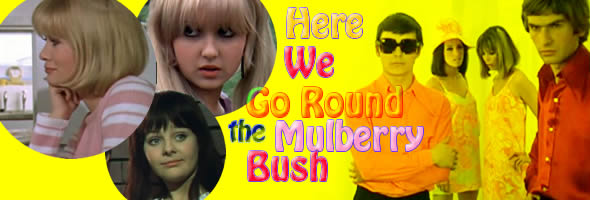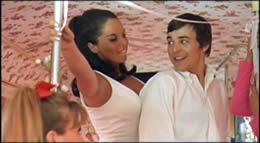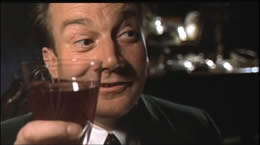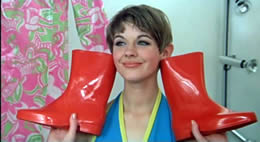

 In an anonymous English suburb, 19-year-old delivery boy Jamie (Evans) has only one thing on his mind: "Girls! Knickers!" He really has his eye on pretty Mary (Geeson), who's also being chased by his best friend, but to lose his virginity he's willing to go for any of the other girls who catch his eye. Unfortunately things never quite seem to work out, be it the dizzy Linda (Posta) or the oh so mod Caroline (Scoular). Even Jamie's younger brother has more luck than he, but when his chance with Mary finally comes, he might have a chance at happiness... or a few more life lessons in store.
In an anonymous English suburb, 19-year-old delivery boy Jamie (Evans) has only one thing on his mind: "Girls! Knickers!" He really has his eye on pretty Mary (Geeson), who's also being chased by his best friend, but to lose his virginity he's willing to go for any of the other girls who catch his eye. Unfortunately things never quite seem to work out, be it the dizzy Linda (Posta) or the oh so mod Caroline (Scoular). Even Jamie's younger brother has more luck than he, but when his chance with Mary finally comes, he might have a chance at happiness... or a few more life lessons in store.
 While British cinema in the '60s was loaded with stories of young men navigating the treacherous highways of love (The Knack, Tom Jones, etc.), Here We Go Round the Mulberry Bush marked a substantial shift towards a pop art-inspired, crowd-pleasing style that quickly morphed into the randy sex comedies that became a major cottage industry throughout the '70s (often starting their titles with the words Confessions of... or Adventures of...). Most of the players here became regular faces in these films for another decade, and the formula is already in place: a randy young hero trying to score, lots of beautiful women who lure him into wacky sexual shenanigans, and just enough skin on display to make people think they're watching a really grown up film. What separates this from its followers is the quality of the filmmaking, as director Clive Donner was coming off a hot streak including 1963's fantastic Harold Pinter adaptation The Caretaker and 1965's hugely popular mod comedy, What's New Pussycat. The latter film's innovative use of pop music is expanded here to include a vibrant, wall-to-wall musical accompaniment highlighted by contributions from The Spencer Davis Group and Traffic, with Steve Winwood providing vocals as he was in the process of jumping from the former group to the latter. The theme song alone is enough to provoke a big grin, and accompanied by Donner's wild color schemes (including some nifty bits of animation and stylized fantasy sequences), it's a great '60s time capsule unlike any other.
While British cinema in the '60s was loaded with stories of young men navigating the treacherous highways of love (The Knack, Tom Jones, etc.), Here We Go Round the Mulberry Bush marked a substantial shift towards a pop art-inspired, crowd-pleasing style that quickly morphed into the randy sex comedies that became a major cottage industry throughout the '70s (often starting their titles with the words Confessions of... or Adventures of...). Most of the players here became regular faces in these films for another decade, and the formula is already in place: a randy young hero trying to score, lots of beautiful women who lure him into wacky sexual shenanigans, and just enough skin on display to make people think they're watching a really grown up film. What separates this from its followers is the quality of the filmmaking, as director Clive Donner was coming off a hot streak including 1963's fantastic Harold Pinter adaptation The Caretaker and 1965's hugely popular mod comedy, What's New Pussycat. The latter film's innovative use of pop music is expanded here to include a vibrant, wall-to-wall musical accompaniment highlighted by contributions from The Spencer Davis Group and Traffic, with Steve Winwood providing vocals as he was in the process of jumping from the former group to the latter. The theme song alone is enough to provoke a big grin, and accompanied by Donner's wild color schemes (including some nifty bits of animation and stylized fantasy sequences), it's a great '60s time capsule unlike any other.  amusing turns by Sheila White (Confessions of a Camp Counselor), Angela Scoular (Ruby from On Her Majesty's Secret Service), and Vanessa Howard Girly). Old pros Denholm Elliott and Maxine Audley also get a terrific extended sequence together as a pair of unusual parents with an affinity for wine, and still-busy TV actor Nicky Henson (Psychomania) pops up in an early role with a really weird hair color. Unfortunately this only translated to moderate success for Evans, who went on to some TV success (Mind Your Language, Doctor in the House), a mid-level Pete Walker film (Die Screaming Marianne), two much raunchier sex comedies (Adventures of a Taxi Driver, Under the Doctor), and a bizarre death that still remains unsolved.
amusing turns by Sheila White (Confessions of a Camp Counselor), Angela Scoular (Ruby from On Her Majesty's Secret Service), and Vanessa Howard Girly). Old pros Denholm Elliott and Maxine Audley also get a terrific extended sequence together as a pair of unusual parents with an affinity for wine, and still-busy TV actor Nicky Henson (Psychomania) pops up in an early role with a really weird hair color. Unfortunately this only translated to moderate success for Evans, who went on to some TV success (Mind Your Language, Doctor in the House), a mid-level Pete Walker film (Die Screaming Marianne), two much raunchier sex comedies (Adventures of a Taxi Driver, Under the Doctor), and a bizarre death that still remains unsolved.
![]()